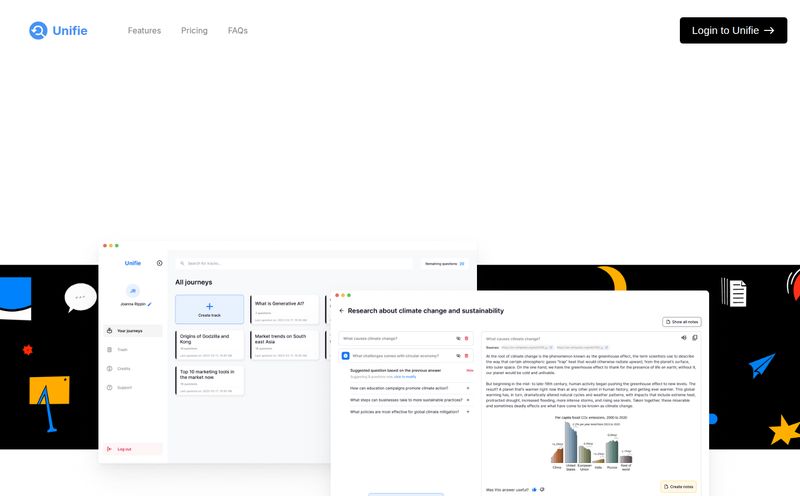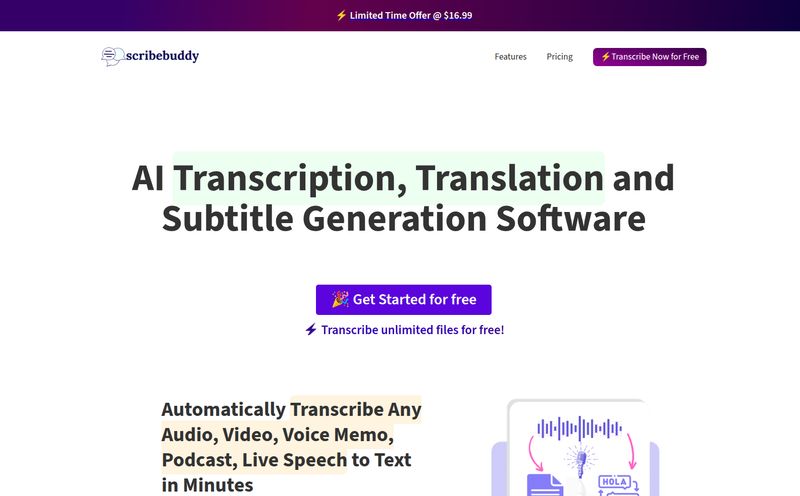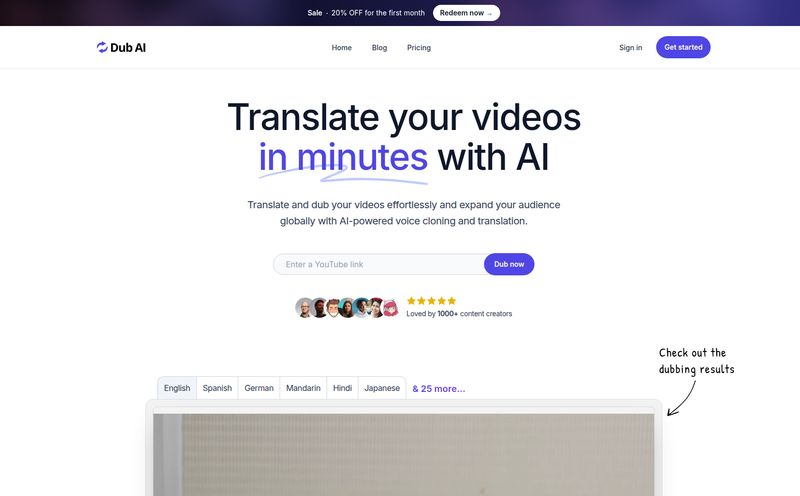I’ve been in the digital marketing and SEO game for years, and if there’s one constant, it’s that the world keeps getting smaller. We’re working with teams in Lisbon, hiring freelancers from the Philippines, and selling to customers in Berlin. It’s amazing. But it also comes with one massive, recurring headache: the language barrier.
We’ve all been there, right? Fumbling with Google Translate, trying to decipher an email where the nuance is just… gone. Or sitting in a video call, smiling and nodding, while having only a vague idea of what’s being discussed. It’s inefficient, it’s awkward, and it can kill collaboration. So when I stumbled upon a tool called Ibis, with its slick interface and bold promises, my curiosity was definitely piqued.
It claims to be a real-time translation platform for text, voice, and video. And it supports over 130 languages. Could this be it? The universal translator we've all been secretly wishing for? Let's take a look.

Visit Ibis
So, What Exactly is Ibis?
First off, let’s get one thing straight. Ibis isn't just another copy-paste translation app. From what I can gather, it's designed to be a communication environment. The whole idea is that you and your group—be it family, friends, or colleagues—can exist in a shared space, or a “Room,” as they call it. Inside that room, everyone communicates in their own native language.
You type in English, your colleague in Japan reads it in Japanese instantly. They reply in Japanese, and it appears on your screen in English. It’s meant to be that fluid. It’s a bold concept that aims to make translation an invisible, background process rather than an active, clunky step you have to take.
Breaking Down The Features
A tool is only as good as its features, and Ibis seems to be packing a few interesting ones. It’s not just one thing; it's a suite of tools for different situations.
Real-Time Text and Voice Chats That Actually Work
This is the core of the platform. The images show a roundtable discussion where messages are translated live. This is huge for international teams. Imagine a Slack or a Teams channel where you don't have to constantly right-click > 'Translate message'. Ibis also handles voice translation, which means you can speak naturally and have your words converted for others in the chat. The goal is real-time, fluid conversation, no matter who is speaking what.
Translate Your Entire Website
Now this is the part that got the SEO in me excited. Ibis offers website translation. For any business looking to go global, this is a massive deal. A properly localized website isn’t just about swapping out words; it's about connecting with a new audience in their own tongue. If Ibis can make that process simpler for businesses, that’s a significant value proposition. It could seriously lower the barrier to entry for small companies wanting to tap into international markets.
Even Phone Calls Aren't a Barrier Anymore
I saw “Chat over the Phone” listed as a feature and did a double-take. Live phone call translation? That's some next-level stuff. While I haven't tested it myself, the promise of being able to call someone who speaks a different language and have a coherent conversation is, frankly, incredible. This could be a game-changer for customer support, international sales, or even just keeping in touch with family abroad.
Transcribing and Translating Media Files
Another neat trick up its sleeve is the ability to handle video and audio files. You can apparently upload a file, and Ibis will generate a full, downloadable transcript—and translate it. For anyone who works with video content, podcasts, or recorded meetings, this is a huge time-saver. No more sending files off to expensive transcription services. This is practical, and I like practical.
Personalization is a Surprisingly Big Deal
Here’s what I think sets Ibis apart from more sterile, corporate tools. It focuses on personalization. In your profile, you can set your default language, of course. But you can also choose the gender of the translated voice that reads messages to you. It's a small detail, sure, but it shows a deep consideration for the user experience. It turns the tool from a cold, robotic translator into something a little more… human. A little more comfortable. It’s about making the technology adapt to you, not the other way around. I've always felt the best tech is the tech you forget you're even using.
Okay, So What's The Catch?
Alright, let's be real. No tool is perfect, and I always approach these things with a healthy dose of skepticism. First, there's the accuracy. Machine translation has gotten scarily good, but it's not infallible. Idioms, sarcasm, and deep cultural context can still get lost. I’d be curious to see how Ibis handles a truly complex, nuanced conversation. You'd still need a human for high-stakes legal or medical translations, obviously.
Second, a tool this powerful likely needs a solid internet connection to work its magic in real-time. That's not a flaw of Ibis itself, just the reality of cloud-based services.
And then there’s the big one: the price. I looked all over the site shown in the images, and the pricing is kept under wraps. You have to click “Get Started” or “Pricing” to likely enter a sales funnel. This is a bit of a pet peeve of mine. I prefer transparent pricing so I can know if a tool is even in my budget before I get invested. Is it a subscription? A per-user fee? We just don't know yet, and that ambiguity is a definite con for me.
My Final Thoughts on Ibis
So, is Ibis the solution to our global communication woes? It just might be a huge leap in the right direction. It’s not just a translator; it's a thoughtfully designed communication platform that integrates translation so deeply that it almost becomes invisible. The focus on different formats—text, voice, phone, websites—is incredibly ambitious.
For remote teams, global businesses, and even just culturally diverse families, a tool like this could be revolutionary. It could foster better understanding and more efficient collaboration. While I have questions about its real-world accuracy and its mysterious pricing, I'm optimistic. Ibis is tackling a very real problem with what looks like a very smart solution. And in this increasingly connected world, that’s something worth paying attention to.
Frequently Asked Questions
- What is Ibis?
- Ibis is a communication platform that provides real-time translation for text, voice, video, and phone calls. It allows people who speak different languages to communicate fluidly within shared digital “Rooms.”
- How many languages does Ibis support?
- According to their materials, Ibis supports over 130 languages, covering a vast majority of global communication needs.
- Can Ibis translate video calls?
- Yes, the platform is designed for real-time conversations. It can provide live translated subtitles during video calls and also transcribe and translate entire video or audio files after they're recorded.
- Does it work on phone calls?
- Yes, one of the standout features mentioned is the ability to translate phone calls in real-time, connecting people across language barriers over the phone.
- Is Ibis free? What is the pricing?
- The pricing for Ibis is not publicly listed on their main page. You typically need to click “Get Started” or contact their sales team to get information on their pricing structure, which may be subscription-based or tailored to team size.
- Is the translation 100% accurate?
- Like all machine translation technologies, the accuracy can vary. While it's likely very advanced, nuances, slang, and complex idioms might not always translate perfectly. It's excellent for general communication but might not be suitable for official legal or medical documents without human review.
Reference and Sources
- Ibis Platform Information: Based on the content and features displayed on the Ibis promotional materials. (As no live URL was provided, this is a placeholder reference).



